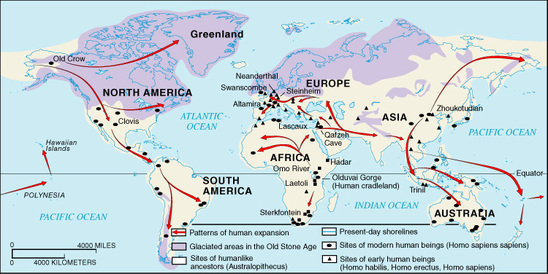Eastern Europe and Russia, AP World History p.2
Foundations to 600 C.E.-A Time of Change
From Foundations to 600 C.E., there was a great amount of change to not only the world but the way humans were organized as well. Throughout this time period, we have found not only the dawn of time and the beginnings of man, but we also saw the development of organized civilization, the beginnings of technological innovation, invention, and specialization, and, probably most importantly, the rise and fall of what could be considered to be the world's greatest civilizaation; Rome.
The earliest known human was in Africa about 2.5 million years ago (AP World Histoy textbook). I think with that the thing that baffles me the most is with that is that the dinosaurs came earlier. Those people started off as hunter-gatherers, and when population increased migration was required (AP World History textbook). This is how the worlds people spread and the reason that there were natives in North America and South America (who arrived between 30,000-25,000) when the Europeans arrived. Farming began during the Neolithic Age, from 8500-3500, beginning in the Middle East (AP World History textbook), right around the time the domestication of animals began. Then around 5000 domestication of plants and crops began (AP World History textbook). About 1000 years later, the Middle East came out with metal tools and writing (AP World History textbook). This is when civilizations begin, starting with the Sumerian civilization in 3500, then the Egyptian civilization in 3100, the Indus civilization in 2500, and so forth and so on (AP World History textbook).
Shortly after this, the classical period begins. This is when the idea of civilization really takes off, especially in China. Specialization was a key topic in this time period. Every civilization specialized in a form of government, religion, skill, export, import, class system, and so on (AP World History textbook). Each individual person specialized during this time period as well; there were farmers, tradesmen, merchants, aristocrats, scientists, probably anything you can think of that doesn't involve modern technology (like video game designer, Steve Jobs, etc.) was a specialty. Civilizations began to connect and trade with each other, leading to wars and fights. The basis of future civilization was based on what happened during this time period; comprehension and understanding of this section is an integral part of understanding World History.
Some questions to ponder while studying this section: How has our past affected our world today? How could it continue to do so in the future? How did certain societies gain some things while others didn't?
The earliest known human was in Africa about 2.5 million years ago (AP World Histoy textbook). I think with that the thing that baffles me the most is with that is that the dinosaurs came earlier. Those people started off as hunter-gatherers, and when population increased migration was required (AP World History textbook). This is how the worlds people spread and the reason that there were natives in North America and South America (who arrived between 30,000-25,000) when the Europeans arrived. Farming began during the Neolithic Age, from 8500-3500, beginning in the Middle East (AP World History textbook), right around the time the domestication of animals began. Then around 5000 domestication of plants and crops began (AP World History textbook). About 1000 years later, the Middle East came out with metal tools and writing (AP World History textbook). This is when civilizations begin, starting with the Sumerian civilization in 3500, then the Egyptian civilization in 3100, the Indus civilization in 2500, and so forth and so on (AP World History textbook).
Shortly after this, the classical period begins. This is when the idea of civilization really takes off, especially in China. Specialization was a key topic in this time period. Every civilization specialized in a form of government, religion, skill, export, import, class system, and so on (AP World History textbook). Each individual person specialized during this time period as well; there were farmers, tradesmen, merchants, aristocrats, scientists, probably anything you can think of that doesn't involve modern technology (like video game designer, Steve Jobs, etc.) was a specialty. Civilizations began to connect and trade with each other, leading to wars and fights. The basis of future civilization was based on what happened during this time period; comprehension and understanding of this section is an integral part of understanding World History.
Some questions to ponder while studying this section: How has our past affected our world today? How could it continue to do so in the future? How did certain societies gain some things while others didn't?
Emily A., 12/13/10
Map from MyHistoryLab

